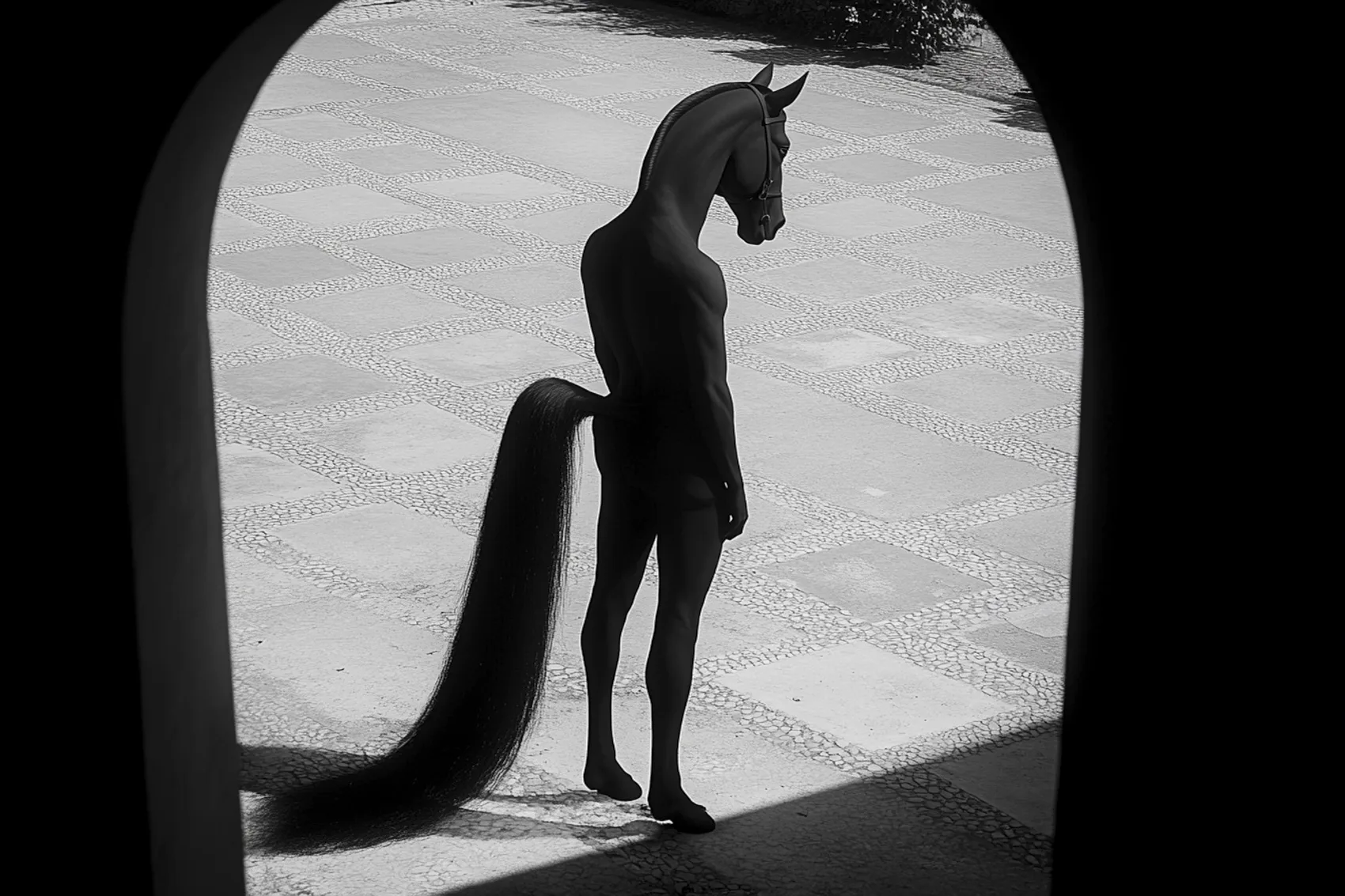notes |

Part 1: Räume des Inneren – Der Blick nach innen
Generative Essays über das, was sich dem Sichtbaren entzieht
Diese Bild-Text-Arbeiten kreisen nicht um das Sichtbare, sondern um das, was sich ihm entzieht.
Erinnerung, Leere, Verlust – nicht als Themen, sondern als Zustände.
Nicht als Erklärung, sondern als Atmosphäre.
Es geht um ein Sehen, das nicht erfasst, sondern empfängt.
Ein tastender, wartender, offener Blick.
Ein fotografischer Blick.
Er zeigt nicht, was ist.
Er lässt erscheinen, was bleibt.

Narzißland
Eine Gesellschaft, die sich nur noch im Bild erkennt, erkennt irgendwann nichts mehr.

„This is not a Picture.“
Wann wird etwas zum Bild? Ist es die bloße Sichtbarkeit, die ihm diesen Status verleiht, oder entsteht ein Bild erst durch die Bedeutung, die wir ihm zuschreiben? Die Serie *„Not a Picture“* spielt subtil mit diesen Fragen und öffnet Räume, in denen das Sehen zu einem poetischen Nachdenken wird – über das, was ein Bild sein könnte und vielleicht doch nicht ist.

„Das Fenster und der Vorhang – Warum kein Bild unschuldig ist“
Aber was ist Fotografie dann? Eine Dokumentation der Welt oder eine Inszenierung des Sehens? Ein offenes Fenster oder ein durchlässiger Vorhang? Ein unschuldiger Blick oder ein manipulativer Schnitt?

Journey to the Uncanny Valley
The term Uncanny Valley originates from robotics and was coined in 1970 by Japanese roboticist Masahiro Mori. It describes the phenomenon where humans respond positively to humanoid robots or animations—up to a certain point. When an artificial figure becomes too realistic yet remains subtly imperfect, it triggers discomfort or even revulsion. This unsettling response is known as the Uncanny Valley, a term that captures the eerie dissonance between familiarity and strangeness.

Annäherung an das Ungesagte
Marisol’s Gaze ist keine Geschichte im klassischen Sinn. Es gibt keine Dramaturgie, keinen Anfang, keine Auflösung. Es ist eine Sammlung von Momenten, von Schwebezuständen. Eine Serie über das, was sich in den kleinen Gesten, in den leichten Verschiebungen von Haltung und Ausdruck entfaltet.

Das Spiel des Allegorischen
Es geht nicht um Wahrheit oder Klarheit. Es geht um das Spiel der Möglichkeiten. Was wir sehen, ist keine Antwort, sondern eine Einladung, sich zu verlieren und immer wieder zurückzukehren, wie der Papagei, der in einer Schleife von Wiederholungen gefangen ist. In dieser Farce zwischen Licht und Schatten, zwischen Bedeutung und Bedeutungslosigkeit, sind wir nicht einfach Zuschauer – wir sind die, die in den Raum hineingehen, um das Bild neu zu erfinden.

Das Unsichtbare, das uns formt
'Marisol' und 'Raven' spiegeln die unsichtbaren Kräfte, die unser Innerstes formen: Hoffnung, Verlust, Erinnerung, Vorstellungskraft. Zwischen Traum und Realität, Greifbarem und Andeutung entfalten diese Essays keine abgeschlossenen Geschichten, sondern ein poetisches Netz von Gedanken – Spiegelräume, in denen unser Bewusstsein ruht.

Ein Plädoyer für den fortdauernden Blick
So bleibt Deine Kraft – jene Haltung der unbefangenen Wahrnehmung – hochaktuell und essenziell. Gerade weil das Medium sich in tausend Verzweigungen verliert, könnte die schlichte, ehrliche Hingabe an den Moment die letzte Bastion des Magischen sein. Sie ist nicht garantiert, nicht einfach, nicht marktgerecht. Doch womöglich ist es dieser fortdauernde, stille Blick, der uns die lebendige Seele eines Motivs noch spüren lässt, selbst wenn ringsum alles zum beliebigen Content verkümmert.

Eine philosophische Reflexion über Fotografie
Sehen ist nicht nur Wahrnehmung – es ist Erkennen, Reflexion und Selbsterkenntnis. Die Fotografie bietet uns die Chance, nicht nur die Welt zu sehen, sondern uns selbst darin zu erkennen und unsere Perspektive auf die Wirklichkeit zu erweitern.

Sehen ist mehr als ein Blick
Sehen ist kein neutraler Vorgang. Es ist eine Wahl. Eine Entscheidung, bewusst oder unbewusst. Wir fokussieren, filtern, überblenden. Mit der Kamera verstärkt sich dieser Prozess. Ein Bild zeigt nicht einfach, es formt, es lenkt, es macht sichtbar – und damit auch unsichtbar.

Plus Proche
"Vous pensez savoir. Et puis, non. Vous ne savez pas."
„Impuissants face à notre époque et aux forces qui y sont à l’œuvre, il ne nous reste que la mémoire, le traumatisme, l’amour, la perte et la compréhension de ce qui s’est passé.“

Male-Rescue
Der Begriff „male rescue“ verweist traditionell auf die Vorstellung, dass Frauen in patriarchalen Gesellschaften oft in passiven Rollen dargestellt werden, wobei ihre „Rettung“ durch eine männliche Figur erwartet wird. Diese hierarchische Struktur, die Frauen als Subjekte der Rettung und Männer als Retter sieht, reduziert die Handlungskraft der Frauen auf das Warten auf externe Hilfe oder Erlösung.

Prends-moi
Ähnlich wie im Film entsteht im Foto eine Zwischenwelt, ein *Eigenraum*, in dem die Figur nicht nur im Hier und Jetzt existiert, sondern durch ihre Pose und die Lichtführung auch eine Reflexion über die Vergangenheit darstellt. Die Position der Hände, die ihr Gesicht teilweise verdecken, erinnern an den Versuch, das Vergangene zu berühren, es aber nicht vollständig zu erfassen.

Emulation of Realities
Artificial imaging technologies to emulate realities that verge on fantasy is becoming increasingly prevalent.

Lolita
„Silent oppression“ captures the delicate precipice where purity teeters on the edge of corruption or experience. It suggests a moment...

Motorbike Taxi
Massiel saß eng an den Fahrer gepresst auf dem Rücksitz des Motorradtaxis, das sie von ihrem jüngsten Interview mit der exzentrischen Isabella Torres zurückbrachte, und spürte den leichten Fahrtwind, der die heißen Sonnenstrahlen milderte, die harte Konturen in die Stadtlandschaft zeichneten.

Emergence in Art and AI: Neri Oxman’s Influence on Generative Photography
"Emergence" is a captivating concept.

Generative Photography
The synergy of artificial intelligence and artistic vision creates new possibilities for a unique experience for the viewer.
